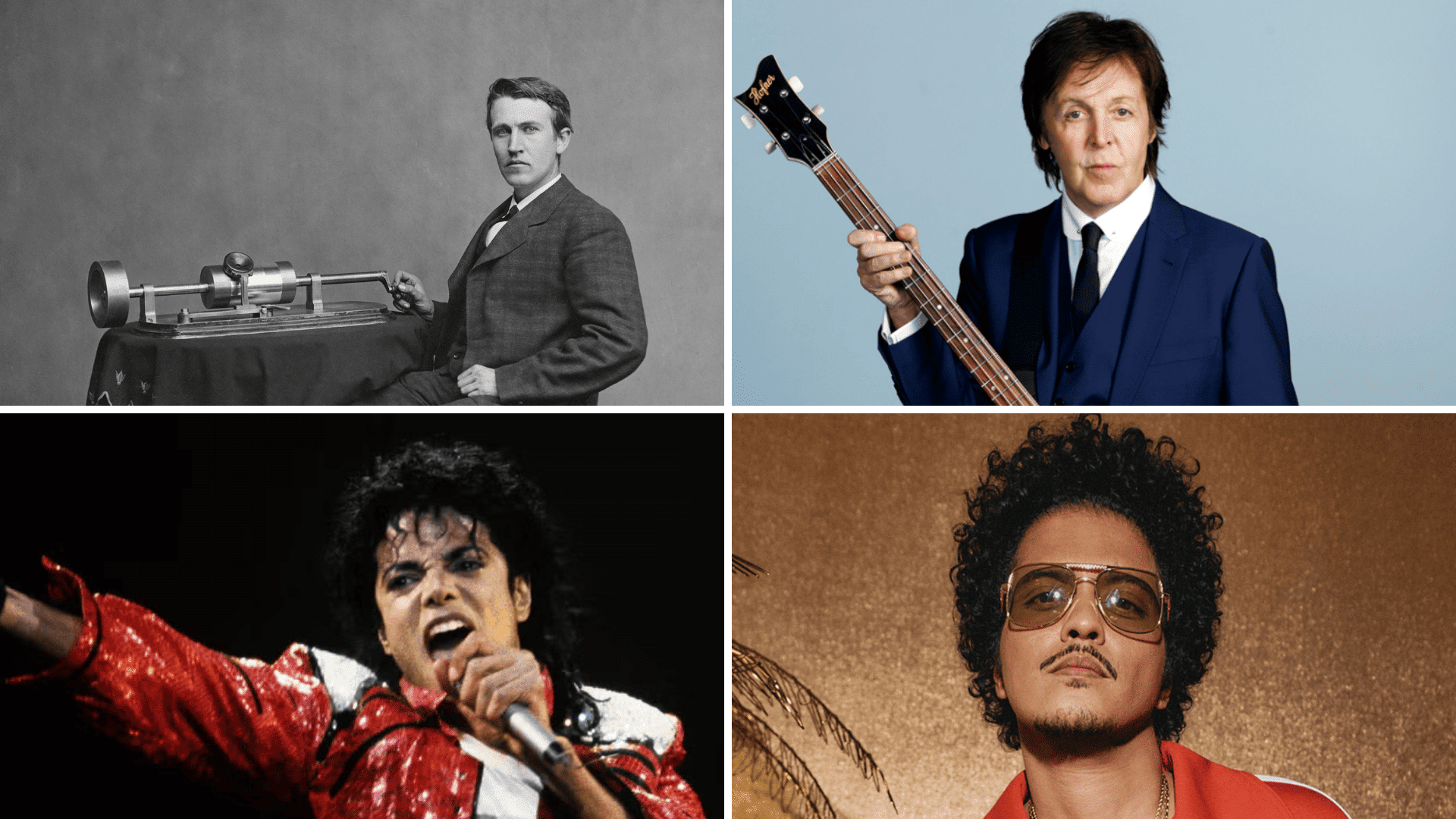Ever wondered why that catchy tune gets stuck in your head for days, or how pop stars manage to make the whole world sing along?
Pop music isn’t just about catchy hooks and flashy videos; it’s a cultural phenomenon packed with mind-blowing secrets.
From billion-dollar recording tricks to artists who changed music history overnight, the pop world is bursting with incredible stories most fans never hear about.
Some of these facts will shock you, others will make you appreciate your favorite songs in completely new ways.
Ready to peek behind the curtain of pop music’s most surprising mysteries?
What is Pop Music?
Pop music is a genre that emerged in the mid-1950s, characterized by catchy melodies, strong beats, and accessible lyrics designed for mass appeal.
The term pop derives from popular, reflecting music that connects with mainstream audiences.
Drawing inspiration from rock, R&B, electronic, and hip-hop, pop music constantly develops while maintaining memorable hooks and repetitive choruses.
Its adaptability makes it the dominant force in today’s music industry, producing chart-topping hits that unite listeners worldwide.
Surprising Facts About Pop Music

From iconic artists to industry secrets, these facts uncover the remarkable moments and milestones that make pop music a global cultural powerhouse.
1. The True Father of Pop Music
While many people regard Michael Jackson as the father of pop music, it was Thomas Edison who is often credited with creating the genre.
This self-trained scientist was experimenting with recording and reproducing sound in the 19th century, and he produced the phonograph.
Edison’s invention laid the foundation for mass music production and distribution, making popular music accessible to everyone.
2. Pop Music’s Name Origin
The term pop music is a short form for the word “popular music.” It was first used in the mid-1950s in some parts of the US and Britain, and music that caught people’s attention and interest emerged.
The genre emerged as a way to categorize music designed for mass appeal, distinguishing it from jazz and classical compositions.
3. The Beatles’ Record-Breaking Sales
The Beatles were the very first pop music phenomenon, achieving unprecedented commercial success that remains unmatched. Their incredible sales figures include:
- 600+ million units sold worldwide during their active years
- 183 million albums distributed in the US alone
- The first pop music phenomenon that created the template for modern pop success
- Evergreen appeal with songs that remain popular across generations
These Fab Four transformed from a Liverpool band into the best-selling pop group of all time, establishing the blueprint for pop music stardom.
4. Michael Jackson’s Thriller Achievement
Michael Jackson achieved considerable success in his musical career, with his album Thriller, recorded in 1982 and produced by Sony Music Entertainment’s Epic Records, reaching a total sales of at least 65 million worldwide.
It remains the best-selling pop music album. This masterpiece revolutionized music videos and pop culture forever.
5. Jackson 5’s Historic Chart Success
In the history of pop, the Jacksons were the first to have four debut singles consecutively top the Billboard Hot 100 chart.
This unprecedented achievement by the family group demonstrated the power of pop music to create instant hits.
Their success paved the way for future pop acts and established the template for manufactured pop groups.
6. Pop Music’s Youth Appeal
Pop music is significantly more popular among teenagers than among older adults. These songs are easy to sing along with, with short verses and repeated choruses that are easy to remember.
The rhythm and pitch also tend to appeal more to the younger crowd, who find it fun to sing along to pop songs.
7. Paul McCartney’s Billion-Dollar Fortune
The wealthiest is one of the Fab Four from The Beatles, and it’s… Paul McCartney. McCartney is one of two surviving Beatles today and holds the title of the wealthiest musician in the world with a fortune of 1.2 billion.
His wealth comes primarily from music royalties and publishing rights accumulated over decades.
8. Pop Music Quality Debate
Pop music may be declining in quality. The comparison is made of today’s pop music compared to the music produced from the 60s to the 90s.
Common arguments include the tendency for increased vulgarity, lower artistic value, and poor singing skills.
Critics argue that modern pop lacks the musical complexity and artistic depth of earlier eras.
9. Pop Music’s Genre Diversity
Pop music often changes over time. So, what counts as pop music today might be different tomorrow. In the 2020s, pop music includes styles like rock, electronic dance music, and hip hop.
This constant evolution keeps the genre fresh and relevant to new generations of listeners while maintaining its core appeal.
10. The Beatles’ Cultural Impact
In the 1960s, The Beatles became a huge pop music group. They changed music forever. Their influence extended beyond music into fashion, culture, and social movements.
The British Invasion introduced American audiences to a new wave of British pop and rock acts that dominated the charts throughout the decade.
11. Pop Music’s Production Teams
Behind every hit song lies an entire ecosystem of professionals working to create and distribute pop music. Here’s who makes it happen:
| ROLE | RESPONSIBILITY | IMPACT |
|---|---|---|
| Studio Staff | Record songs and create music videos | Shape the final sound quality |
| Production Teams | Mix and master tracks | professional audio standards |
| Distribution Staff | Get music to stores and platforms | Make songs accessible to fans |
| Tour Staff | Manage live performances & equipment | Bring music to life on stage |
| Promotional Staff | Market music to radio and media | Create buzz and drive sales |
These unsung heroes work tirelessly behind the scenes to transform raw musical ideas into the polished pop hits we love.
12. Bruno Mars’ Real Identity
Bruno Mars is named Peter Hernandez. He took the name Bruno after the famous wrestler Bruno Sammartino, who he resembled in appearance.
According to his father, the surname Mars was inspired by his early fans, who likened his talent to extraterrestrial abilities. This creative stage name perfectly captures his otherworldly talent.
13. Elvis Presley’s Songwriting Truth
Elvis Presley recorded over 600 songs during his career, yet he is not the author of a single one of them.
Despite being the King of Rock and Roll, Elvis was primarily an interpreter rather than a songwriter. His genius lay in his ability to change existing songs into iconic performances that defined an era.
14. Toto’s Connection to Thriller
The band Toto, made famous by their single Africa, was Michael Jackson’s backing band on the album Thriller. This collaboration between the rock band and the pop superstar resulted in one of the most successful albums in music history.
Their professional musicianship contributed significantly to Thriller’s polished and innovative sound that set new standards.
15. Freddie Mercury’s Unique Features
Freddie Mercury was born on the island of Zanzibar on the east coast of Africa.
He had four extra teeth in his upper jaw, which caused not only his distinctive overbite but also, according to unconfirmed speculation, his enormous vocal range. His refusal to fix his teeth preserved his legendary voice.
16. The Ramones’ Beatles Connection
The Ramones’ band name has a surprising connection to Beatles history. Here’s the fascinating story behind their identity:
- Origin: Named after Paul McCartney’s hotel alias “Paul Ramon”
- Purpose: McCartney used this fake name to escape paparazzi attention
- Tribute: The punk pioneers honored the Beatles’ privacy tactics
- Legacy: This Beatles connection became the identity of punk rock revolutionaries
This tribute to the Beatles’ privacy tactics became the foundation for one of punk rock’s most influential bands, showing pop music’s far-reaching influence.
17. Van Halen’s M&M Test
Van Halen had particular requests to the organisers regarding the popular M&M’s.
There was always a large bowl filled with M&M’s waiting for them in the dressing room, but it could not contain brown candy.
It was a camouflage manoeuvre by which they could tell if the organiser had read all their requests.
18. “Happy Birthday” Copyright Facts
The song Happy Birthday has a copyright owner. It is Warner/Chappell Music, and they earn approximately two million US dollars each year from the reproduction of this indispensable birthday anthem.
However, this goldmine is due to end in the US in 2030, having already ended in the European region in 2016.
19. My Heart Will Go On Recording
Celine Dion’s iconic Titanic ballad has some surprising recording facts that showcase the unpredictable nature of pop music success:
| FACT | DETAIL |
|---|---|
| Recording Takes | Recorded in just one take |
| Original Status | A demo version |
| Director’s Opinion | James Cameron initially didn’t want it in the film |
| Chart Performance | Became one of the best-selling singles ever |
| Awards Won | Multiple Grammy Awards, including Record of the Year |
| Cultural Impact | Defined the sound of 1990s pop ballads |
This reluctant addition to the Titanic soundtrack became a defining moment in pop music history, proving that sometimes the best hits happen by accident.
20. Rihanna’s Umbrella Origins
Rihanna’s song “Umbrella” was initially intended for Britney Spears, but her record label rejected it. This rejection turned into Rihanna’s breakthrough hit, launching her into global superstardom.
The song spent seven consecutive weeks at number one on the Billboard Hot 100 and became a defining anthem of the 2000s pop era.
21. Pop Music’s Commercial Appeal
Pop music is an inclusive term that describes music that is popular in the mainstream. Pop songs are played on the radio every day, and artists like Taylor Swift sell millions of albums each year!
The genre’s commercial success drives the entire music industry, with pop artists consistently dominating sales charts and streaming platforms worldwide.
22. Ten Types of Pop Music
Pop music’s diversity is truly remarkable, with research revealing ten distinct variations that showcase the genre’s creative evolution:
- Traditional Pop: The classic mainstream sound
- Folk Pop: Acoustic-influenced melodic style
- Chamber Pop: Orchestral and sophisticated arrangements
- Synthpop: Electronic and synthesizer-driven music
Additional subgenres include Shiver Pop, MetroPOPolis, Indie Poptimism, Shimmer Pop, and Indie Pop.
This incredible diversity demonstrates pop music’s adaptability and creative evolution across different musical landscapes.
23. Pop Song Structure Formula
Pop songs typically follow a structured format consisting of an intro, verse, chorus, verse, chorus, bridge, chorus, and outro.
Our ears are naturally trained to recognize these familiar song structures, which is why a new song may sound familiar upon first listen. This formula creates instant familiarity and memorability.
24. Pop Music’s Global Reach
Pop music’s universal appeal transcends borders and language barriers. It has the power to unite people from different cultures and backgrounds through shared enjoyment of its upbeat rhythms and relatable lyrics.
This universality makes pop music a powerful force for cultural exchange and understanding across diverse global communities.
25. Collaboration and Crossover Success
Pop music is known for its exciting collaborations and genre crossovers. Artists from different musical backgrounds come together to create unique and unexpected fusions, resulting in fresh sounds that captivate listeners.
These collaborations break down musical boundaries and introduce fans to new genres and styles.
26. Music Videos’ Cultural Impact
Pop music and music videos go hand in hand. The visual storytelling of music videos enhances the listening experience and helps create memorable moments.
Iconic music videos, such as Michael Jackson’s Thriller and Beyoncé’s Single Ladies(Put a Ring on It), have become cultural phenomena and are often referenced in popular culture.
27. Pop Music’s Timeless Ability
Despite the ever-changing music landscape, pop music has stood the test of time. It continues to evolve and adapt to new trends, staying relevant and resonating with audiences of all ages.
Pop music’s ability to capture the aroma of the moment and provide an escape from everyday life contributes to its enduring popularity.
Different Styles That Became Pop
Pop music thrives by blending diverse musical styles. Here are some of the key genres that have influenced and shaped the evolution of pop:
- Rock: Early pop drew from rock ‘n’ roll, with artists like The Beatles and Elvis Presley defining mainstream appeal.
- Disco: Acts such as ABBA and the Bee Gees brought infectious dance rhythms into the pop scene.
- Funk & Soul: Icons like Michael Jackson and Prince infused pop with groove, rhythm, and emotional depth.
- Hip-Hop: Contemporary pop often features rap elements, evident in songs by Drake, Lizzo, and Doja Cat.
- Country: Taylor Swift’s crossover from country to pop brought storytelling and acoustic influences.
- Electronic/Dance: Synths and EDM beats power the sound of stars like Dua Lipa and The Weeknd.
- Alternative & Indie: Artists like Billie Eilish have introduced minimalist, moody aesthetics into mainstream pop.
These hybrid influences keep pop music dynamic, culturally relevant, and ever-evolving.
These pop music facts reveal the history, surprising trivia, and cultural impact of the world’s most popular musical genre.















